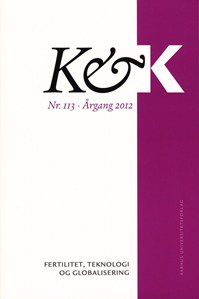(U)levelige slægtskaber. En analyse af filmen "Rosa Morena"
DOI:
https://doi.org/10.7146/kok.v40i113.15724Keywords:
transnational adoption, biopolitics, necropolitics, sexuality, Rosa Morena, race, queer, equality, kinship, homonormativityAbstract
UN/LIVEABLE KINSHIP. READING ROSA MORENA | The Danish movie Rosa Morena (2010) tells an unusual story about kinship in which a white homosexual Danish man adopts a child born to a poor black Brazilian woman. Using a theoretical framework of biopolitics and affective labour the article highlights how the male homosexual figure is cast as heteronormative and white in order to gain cultural intelligibility as a parent and thus to become the bearer of a liveable kinship. The casting rests on the affective and reproductive labour of the Brazilian birth mother who is portrayed as an unsuited parent through a colonial discourse steeped in sexualized and racialized imagery. A specific distribution of affect, where anger turns into gratefulness fixates and relegates the birth mother to a state of living dead, and thus she becomes the bearerof an unliveable kinship. This economy of life and death constructs transnational adoption as a vital event in a Foucauldian sense. The adoption, simultaneously, folds a white male homosexual population into life and targets a racialized and poor population as always already dead.
Downloads
Published
2012-06-20
How to Cite
Myong, L., & Petersen, M. N. (2012). (U)levelige slægtskaber. En analyse af filmen "Rosa Morena". K&K - Kultur Og Klasse, 40(113), 119–132. https://doi.org/10.7146/kok.v40i113.15724
Issue
Section
Articles
License
Tidsskriftet følger dansk ophavsret.





